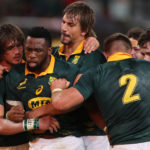Boks’ 50 percent year is worth celebrating
It’s fitting that the Springboks had a 50% win record this year, with good and bad moments in fairly equal measure. But is there enough to suggest an upward swing before the World Cup?
Author:
31 December 2018

Several Springboks and coach Rassie Erasmus exchanged the word “inconsistent” with great efficiency in their assessment of 2018, unlike the many missed jumps in the line-out and poorly executed back line moves throughout a frustrating season.
Erasmus was honest in his assessment of this year’s campaign. “We were great at times, but we were also really poor at times,” he said, wearing a visible mix of fatigue and relief on his face after another gruelling year of rugby. “It wasn’t the best season, but it certainly wasn’t the worst.”
Erasmus’ side played 14 tests in 2018, winning seven and losing seven. Former coach Allister Coetzee achieved a win rate of 53.8% in 2017, and also outperformed Erasmus on the number of tries scored (39 to Erasmus’ 37), tries per game (3 to Erasmus’ 2.64) and win percentage away from home (42.8% to 37.5%). This year, the Boks also conceded more points per game (23.57) than last year’s vintage, 22.7.
The inconsistencies and the bare facts suggest there has been a regression, but there is a genuine feeling among the players that the team has improved. For captain Siya Kolisi, the outlook is positive.
Related article:
“I think you can see by the way we played in periods throughout the year that we’re definitely a team on the rise,” Kolisi said. “There were ups and downs, and we struggled to find each other on the field at times. But we’re confident we’re heading in the right direction, and if we can iron out one or two issues, we’ll definitely be contenders at next year’s World Cup.”
Against New Zealand in Wellington, where the Boks bravely held on for a famous 36-34 win, Kolisi’s charges looked like they could one day be world beaters. Earlier in 2018, come-from-behind victories against Eddie Jones’s much fancied England on home soil showed they were able to climb through the gears with dynamic running rugby when required.
Losing winnable games
But these sweet joys were soured by losses in winnable games away to Australia and Argentina, and, no matter what you made of Owen Farrell’s assault on Andre Esterhuizen, the lack of precision against England in London meant that South Africa rightly ended up on the losing side.
“I don’t know, man. That’s the big question, isn’t it?” Kolisi shot back when asked to identify the reason for the inconsistent performances.
According to Erasmus, this is the result of a lack of experience throughout the squad in key positions. Scrum half and fullback were particular areas of concern during the European tour in the absence of Faf de Klerk and Willie le Roux, and, despite plenty of world-class talent, there was a noticeable lack of cohesion among the heavies in the pack.
Related article:
“A lot of our younger players perhaps got a bit intimidated by the big occasion and in front of the big crowds, but they’ll learn from that,” Erasmus said, admitting that juggling the need to win and the need to put mileage on young legs was his biggest challenge of 2018. “Our plan when we started this project at the start of the year was to have as many players as close to 18 Test caps by the time the World Cup starts [in September 2019, in Japan]. I personally didn’t always get the tactics right, but I’ve had to sacrifice short-term goals for long-term ones at times.”
Erasmus continued: “But we’ve seen how some of the guys are developing. Against England [at home in June] we put zero caps on the right wing [Sbu Nkosi] and zero caps on the left wing [Aphiwe Dyanti], and both those guys are now two of the most exciting players in the world.”
Channeling Tyson and Mayweather
Dyanti, in particular, has caught the eye, and was rightly named World Rugby Breakthrough Player of the Year at a glitzy ceremony in Monaco in November. His rise has been rapid. Only three years ago, he was running out for the University of Johannesburg in the Varsity Cup, and now he has the potential to hold on to the Bok No. 11 jersey for a generation.
“It’s been an incredible season,” said the 24-year-old speed machine. “I’ve learned so much this year, especially from the losses in Europe. Playing in those conditions against those teams is like boxing against Floyd Mayweather. It’s all tactics and precision, and every time you throw a punch you have to expect a quick counterpunch.
“In the southern hemisphere, we fight like Mike Tyson. It’s not that we’re not technical, but we’re looking for the big knockouts most the time. But you can’t always fight like that. We’re definitely a better side than we were before the start of this tour because of the lessons we learned.”
Dyanti’s rise is also a victory for those fans who still yearn for a Springbok side that better represents the racial demographics of the nation. His impact is certainly not lost on his captain.
Related article:
“South Africa is a unique place, and we have extra concerns beyond just winning rugby games,” said Kolisi, the first black African to skipper the Boks. “Aphiwe has been a pillar for black excellence in the sport this year, and he has made all Springbok fans, black and white, extremely proud. We don’t listen to the critics who say that transformation hurts our chances of success. Just look at what this young guy has achieved and will continue to achieve.”
Fifth-best but on the up
Erasmus accepted there was a gap between his team and the teams at the top. He spoke highly of Warren Gatland’s Wales, whom he said were able to field at least two world-class players in every position, allowing for rotation. He heaped praise on Ireland, whom he said were as good as the All Blacks. He emphasised his admiration for England and the resilience of their controversial coach.
That leaves the Springboks as the fifth-best team in the world, according to both their coach and the IRB world rankings. Throughout 2018, there were plenty of moments that had Bok fans pulling out their hair and tipping over the biltong bowl. But there were also moments that instilled long-lost belief in the green and gold.
It was a year of sizzling back line moves finished by fleet-footed laaities; resolute defence that showed the potential to hold off a Roman phalanx; and the emergence of some unlikely heroes, with a special mention going to the bulldozing presence of Bongi Mbonambi.
Lifting that famous little trophy at the Yokohama Stadium on 2 November seems an unlikely prospect given the quality of the opposition. But there were enough signs over the 14 tests in 2018 to suggest an upward swing. From the lows of the previous administration, that is certainly worth celebrating.



